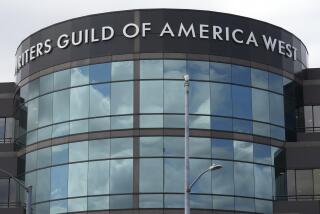Who Can Edit a Movie? Directors Guild Files Suit
- Share via
The Directors Guild of America fired its first legal shot Friday at a collection of movie-rental and software companies that are digitally snipping gore, sex and profanity from scores of popular motion pictures.
In documents filed in federal court in Denver, the DGA asked that 13 companies be ordered to stop violating federal copyright law.
The legal action came after years of verbal scuffling between directors and a burgeoning movement, centered in Utah but spreading into other states, that targets consumers who are put off by explicit films.
Some of the companies--most notably CleanFlicks, head-quartered in a suburb of Salt Lake City--rent edited videos. Other companies sell software that lets consumers, via their computers or DVD players, edit a DVD copy of a movie to a variety of specifications.
Most of the companies have sprouted recently to take advantage of the ease of digitally changing content. Many of the operators of the companies contend they are trying to give consumers no more than the sanitizing studios already do when they release films for viewing on commercial airplanes or network television.
Jay Roth, national executive director of the DGA, called the editing “a direct frontal assault on all aspects of ownership and creativity” because the changes were made without any consultation.
A CleanFlicks operator in Colorado and a man characterizing himself as an inventor of software technology filed the original legal action last month against the DGA and 16 prominent directors. They said they were taking preemptive action to counter the anticipated DGA lawsuit. The documents filed Friday by the DGA were in the form of a counterclaim, asking the federal court to expand the case to include CleanFlicks’ corporate office and the other companies as targets of the DGA’s action.
CleanFlicks contends it does not violate copyright law because it purchases a new copy each time it edits a film, and because customers are technically owners of the videos through a co-op arrangement.
CleanFlicks opened its first two stores two years ago, and says it has 76 outlets operating in 18 states through franchise agreements. It says its first California outlet is planned for Sacramento.
The DGA maintains the process is a violation of federal copyright law, which holds that only the copyright holder has the right to make a “derivative” work. Attorneys for companies that produce the edited videos argue in some cases that the changes are so minor they comply with a “fair use” exemption in copyright law.
Copyright experts interviewed by The Times agreed with the guild’s position, but cautioned that federal courts in different parts of the U.S. have issued a variety of interpretations on copyright infringement in other types of media. They said any initial ruling seemed likely to wind up in the hands of an appeals court.
In a letter published in the DGA’s monthly magazine, now being mailed to members, the organization’s president, Martha Coolidge, said the controversy centers on a moral question: “Is it right to take finished films that have been created by someone else, change them to suit your whims, then profit by the commerce of these grossly altered products--and at the same time portray these versions as still being the works of their original directors?”
That argument touches on an international copyright doctrine known as the “moral right” of a work’s creator--the notion that no distortion of the author’s work should be permitted.
The DGA has argued for more than a decade that U.S. copyright law should be amended to include that provision.
More to Read
The biggest entertainment stories
Get our big stories about Hollywood, film, television, music, arts, culture and more right in your inbox as soon as they publish.
You may occasionally receive promotional content from the Los Angeles Times.










